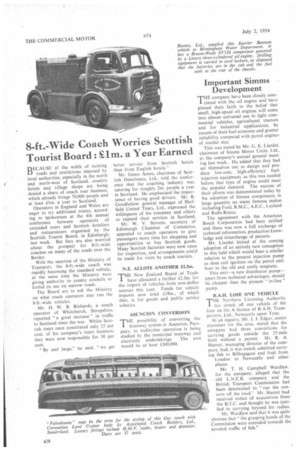Si mms airilms
Page 54

If you've noticed an error in this article please click here to report it so we can fix it.
Development
THE company have been closely associated with the oil engine and have pinned their faith to the belief that small, high-speed oil engines will come into almost universal use in light commercial vehicles, agricultural tractors and for industrial applications, by reason of their fuel economy and greater reliability compared with petrol engines of similar size.
This was stated by Mr. G. E. Liardet, chairman of Simms Motor Units, Ltd., at the company's annual general meeting last week. He added that they had set themselves out to design and produce low-cost, high-efficiency fuelinjection equipment, as this was needed before that type of engine could meet the popular demand. The success of their efforts was demonstrated today by the adoption of Simms components in large quantity on many famous makes including Ford, B.M.C., A.E.C., Leyland and Rolls-Royce.
The agreement with the American Bosch Corporation had been ratified and there was now a full exchange of technical information, production knowledge and interchange of patents: Mr. Liardet hinted at the coming adoption of an entirely new conception in this field which would bear a similar relation to the present injection pump as does coil ignition on the petrol unit bear to the old and costly magneto.
This unit—a new distributor pump— apart from technical advantages, should be cheaper than the present in-line" Pump.
R.A.H. LOSE ONE VEHICLE
THE Northern Licensing Authority has struck off one vehicle of the four on the A licence of R.A.H. Transporters, Ltd., Newcastle upon Tyne.
At an inquiry, Mr. J. J. Edgar, senior examiner for the area, stated that the company had three convictions for carrying goods outside the 25-mile limit without a permit. Mr. R. A. Hunter, managing director of the company, had. it was stated, admitted carrying fish to Billingsgate and fruit from London to Newcastle and other places.
Mr. T. H. Campbell Wardlaw, for the company, alleged that the old L.N.E.R. company and the British Transport Commission had been determined to "run the concern off the road." Mr. Hunter had received notice of acquisition from the B.T.C. and thought he was justified in carrying beyond his radius.
Mr. Wardlaw said that it was quite
obvious that " the grasping hands of the
Commission were extended towards the coveted traffic of fish."








































































































































